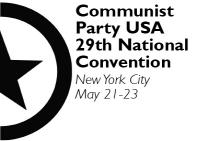 This article is part of the discussion leading up to the Communist Party USA’s 29th National Convention May 21-23, 2010. CPUSA.org takes no responsibility for the opinions expressed in this article or other articles in the pre-convention discussion. All contributions must meet the guidelines for discussion. To read other contributions to this discussion, visit the site of the Pre-Convention Discussion period.
This article is part of the discussion leading up to the Communist Party USA’s 29th National Convention May 21-23, 2010. CPUSA.org takes no responsibility for the opinions expressed in this article or other articles in the pre-convention discussion. All contributions must meet the guidelines for discussion. To read other contributions to this discussion, visit the site of the Pre-Convention Discussion period.
All contributions to the discussion should be sent to discussion2010@cpusa.org for selection not to the individual venues.For more information on the convention or the pre-convention discussion period, you can email convention2010@cpusa.org.
There has been a lot of discussion about what Communists contribute to the struggle. Is the problem that we haven’t figured out what we add? Or that we’ve abandoned the idea that we add something unique? I don’t think so.
In my opinion, the issue is not whether we add something, but what that something is.
Over the past decade, we have spent gallons of ink, millions of keystrokes and clicks, and a lot of vocal power on making this case: that Communists are indispensable first and foremost because of our strategic policy, and that our role is to build the working-class movement and within that, a stronger Communist current.
We have said that Communists’ contribution to that movement is a package deal: an action orientation, a focus on the grassroots and rank and file, a determined fight for unity of all kinds, and an understanding of the key role of the organized section of our working class, and of its key allies.
In the Communist Manifesto, Marx said, “Communists fight for the attainment of the immediate aims… of the working class; but in the movement of the present, they also represent and take care of the future of that movement.”
I like this way of putting it. It expresses the two-sidedness of things (dialectics!); it expresses struggle and process.
I especially like it because it says that you cannot separate Communists’ role in the actual, present-day struggles from the need and reasons to grow our own organization. Striking the right balance between the two is a big challenge that we have been continuously struggling to achieve.
If our role was only, or mainly, to raise advanced demands, or point to the roots of people’s problems in capitalism, then what would that have meant for the health care reform battle of this past year?
Based on my own experience in the local health care reform movement, it wouldn’t have made us unique – there were others who favored more radical change (single payer) even some who called for socialized medicine. Most people were pretty convinced about the destructive role of corporate greed and control of politics.
What was lacking – and what was really needed – were efforts to find common ground, suggestions for practical initiatives, proposals for ways to engage the people in our working-class community on this critical fight, and making connections between our group’s efforts with those of the labor movement.
So that’s what we did. In the early days, we argued that it would be a mistake to draw lines in the sand on what we would or wouldn’t accept in a health care reform bill, and that we should figure out what kinds of activities we could all agree to work on. We proposed ways to reach out to people and involve them in this battle (and once the Tea Party gang started doing their dirty work, this became even more urgent).
We sought ways to work with other organizations, including and especially labor. We pushed for holding public events. We circulated materials from the labor movement, which were extremely helpful, unifying, and clear about the importance of serious reform, and what it would take to win.
So that’s how we “fought for the immediate aims,” in the movement of the present.
What did we do about the future of the movement?
Although we have not yet asked anyone to join the Party, we have laid a solid basis for doing so.
We have added to our list of readers of our online press, to which we regularly sent articles on the health care fight and other subjects. We invited people to our meetings and events (both political and social!). We hosted two classes on our strategic policy. We have a group of working-class people around us who respect both our ideas and our practical work, and who are interested in our organization.
We have done what we needed to do – helped to build the movement for social progress, while also trying to strengthen our own organization’s presence in that movement, and we expect to grow on the basis of that way of working, which is the bottom line: when we recruit people into our club – which I’m confident we will do – they will join because of the way we worked, and what we brought to this critical fight.

 Join Now
Join Now